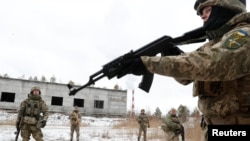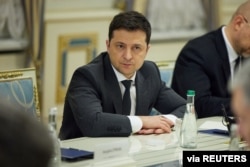Ukrainian President Volodymyr Zelenskyy has called up army reservists and ordered military exercises for volunteers in newly created territorial defense brigades, but senior opposition lawmakers and former ministers fear the country is ill-prepared for war with Russia — despite their pleas to the government to get organized.
With credible reports mounting of more Russian forces crossing into Moscow’s breakaway republics in Ukraine’s eastern Donbas region, a clamor is building from opposition parties in the Verkhovna Rada, the country’s parliament, for much more intensive war-planning. They are demanding the government start in earnest to draft civil defense orders and to mobilize Ukrainians.
Zelenskyy, in a televised address February 22, said Russia’s threat to Ukraine’s sovereignty has compelled him to recall reservists to active duty, but he has urged civilians to go about their normal lives and he has turned his back on mobilizing civilians and to allocate civil defense and emergency roles.
In his short speech overnight Monday, he said: “Regarding security and defense. Today there is no need for general mobilization. We need to promptly replenish the Ukrainian army and other military formations.”
Zelenskyy has been saying for weeks that Ukrainians should remain calm, and he publicly upbraided earlier this month US politicians for warning of an imminent invasion — saying it was damaging Ukraine’s economy and risked panicking Ukrainians unduly. He is being restrained in defense planning for the same reason, political allies told VOA.
Ivanna Klympush-Tsintsadze, a former deputy prime minister in the government of Zelenskyy’s predecessor Petro Poroshenko and now a lawmaker, complains Zelenskyy has been much too slow to prepare Ukraine for an existential war. She harbors no doubts that Russia’s President Vladimir Putin is methodically uncoiling his forces on her country’s borders — and that serious defense planning should have been under way long before now.
For months she and some other opposition lawmakers have been trying to get additional funding for Ukraine’s armed forces, but the legislation has languished in the Verkhovna Rada. The extra funding has only just been included for consideration.
State of emergency
“I really hope that finally today [Wednesday] we will take the decision in the Parliament on allocating additional money to the armed forces of Ukraine in order to both raise salaries for the officers and soldiers but also to be able to buy more weaponry,” she told VOA. She says Zelenskyy should be asking the United States for a Lend-Lease program, modeled on the one Franklin D. Roosevelt set up in World War II, which enabled the US to supply Britain, Russia, and Free France with food, oil and military equipment.
On Wednesday the country's defense and security council asked Zelenskyy to declare a state of emergency and Zelenskyy has agreed to do so. But he is also being urged by lawmakers to announce martial law in Donbas, something his aides say would be spun by Moscow as provocative.
Klympush-Tsintsadze and other lawmakers are alarmed at the absence of serious civil defense and emergency planning. “We are pushing the government to ensure we have strategic resources available — energy, food, water and medical supplies. We also need to know how many medical professionals we have capable of treating war injuries,” she says.
Asked why she thinks there has been little detailed planning for a bigger war going far beyond eastern Ukraine, she fumes: “I think it's because for three years, Zelenskyy has been hoping that his special charm will soothe Putin. He seems to think that in order to stop the war all we have to do is stop shooting. And obviously that has proven wrong. There has been a lack of professionalism.”
She says she is being inundated by friends, acquaintances and constituents asking what they can do in a national effort to defend Ukraine, but there is no guidance from the government. Only on Monday did Zelenskyy meet leaders of all the parliamentary factions and parties — the first time he has done so in the three years he has been in office, she complains.
Other prominent lawmakers are anxious about Ukraine’s preparedness for war, although they all believe that Moscow is seriously underestimating the fighting spirit of Ukrainians. They say the international media is too focused on stories about individual Ukrainians displaying fortitude and expressing defiance, but the nuts-and-bolts of fighting a war will be crucial and the media should be asking questions of the government about defense planning.
Opposition discontent
Lesia Vasylenko, one of 20 parliamentarians from Holos (Voice), a liberal and pro-European political party judges that Putin’s speech on Monday amounts to a “declaration of war,” or rather an intention to wage a bigger war, a continuation of aggression against Ukraine that goes back to 2014 when Russia annexed forcibly Crimea and shaped the creation of what she sees as “make-believe” republics in eastern Ukraine.
But she isn’t happy with Zelenskyy’s performance. She says he should have given his response to Putin’s speech not in the early hours of the morning and on television “but in parliament, on the podium, addressing lawmakers, the representatives of the Ukrainian people.”
She told VOA: “It would have had immense impact and meaning to the people of Ukraine and could have raised morale and sent a much more powerful message to Putin.” But she is also frustrated by the lack of preparedness and thinks Zelenskyy thinks only one step ahead, unlike Putin who is thinking four or five moves ahead.
Zelenskyy, a 44-year-old former television star and political novice, has been determined to keep his nerve and to try to cool tensions, say allies.
An informal adviser to Ukraine's leader said he "also wants to avoid doing anything Moscow could claim is provocative and war-like." He added: "We need to pace ourselves." He spoke on condition he not be identified in this article.
Vasylenko adds: “Ukraine is trapped with a national leader who does not think strategically because he doesn’t have the people around him who think strategically. I think that's the thing that he will be blamed for later. It's not about knowing everything. It's about refusing to have in your entourage experts who know what questions to ask and having advisers who can contradict and challenge you. He picked close friends and trusted allies with little technical or government experience over real experts, and we may pay a price for that.”
She and other opposition lawmakers say they have for weeks pleaded with ministers to draw up strategic civil defense plans. Vasylenko has been at the forefront clamoring for details on what energy and food reserves the country has readied but she hasn’t been able to secure answers.
On Friday, some key committees have an oversight hearing with the cabinet of ministers and will be pressing again for details. “But to be honest, I'm very skeptical we will get any answers, because every time we make specific requests for information from ministries or regional departments, we get nothing — they just don't have any information,” she says.
Some lawmakers who attended last week’s Munich Security Conference say they were disappointed when some European politicians told them Ukraine should be readying to form a government in exile. The suggestions dovetail with unconfirmed reports that U.S. officials have raised with Zelenskyy the idea of relocating from Kyiv to Lviv in western Ukraine near the Polish border — to where the U.S. and some other Western powers have moved their ambassadors.
Klympush-Tsintsadze says when the idea was raised with her at Munich that plans should be drawn up for a government-in-exile, she responded with disgust. “We are not going anywhere,” she says. “People were very disappointed when Western military instructors were withdrawn from Ukraine and when the embassies were relocated. It did not play well with Ukrainians.”
She adds: “I was mad yesterday when a TV journalist from a foreign broadcaster asked me why we would fight back and try to withstand an attack from Russia, which has one of the biggest armies in the World. I reacted emotionally. If my services as a lawmaker are not needed, at that point I will either get a weapon or do something useful and bandage the wounded, I know how to do that.”









